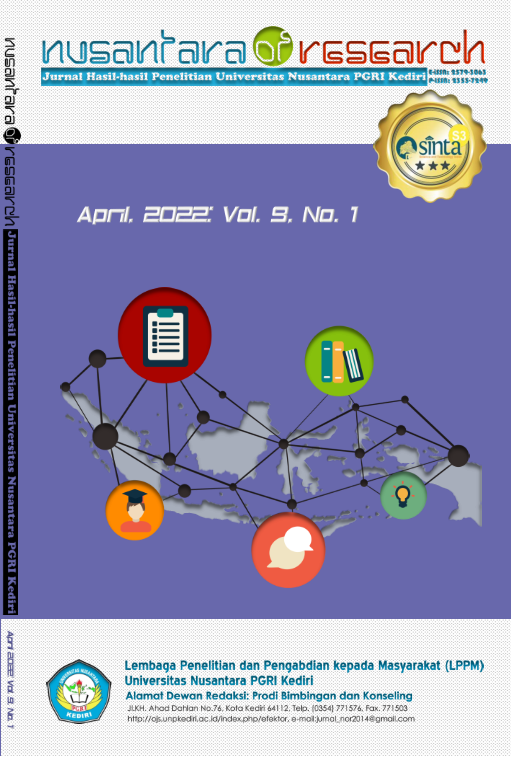Student Burnout Measurement Scale in Completing Thesis: Supporting Instrument for "BAPER" Development
Main Article Content
Abstract
This research stems from the rise of the burnout phenomenon experienced by students when completing their thesis. The burnout that makes the study period will have a negative impact on the student's motivation to learn and self-esteem, as well as on the assessment of the accreditation program. Students in these cases often vent their emotions on social media such as writing statuses on WhatsApp, Facebook, and Instagram. Their expressive writings are considered unethical. Therefore, research was conducted with the aim of developing a Handbook for Expressive Writing (BAPER) which could be tested both theoretically and practically. The research method used is Research and Development from Borg & Gall. Currently, the research stage is entering the third stage, namely the Development of Initial Product Drafts, one of which is the preparation of instruments. Instrument validity and reliability are important things that must be considered to obtain representative data for the purposes of selecting research samples that will use purposive sampling. The instruments were tested on 37 undergraduate students who were in the process of completing their thesis. They are scattered in several study programs in the Nusantara PGRI Kediri. Then obtained 14 valid items with a reliability index of 0.886. Items that have been valid and reliable can represent all indicators of burnout. Based on these results, the Student Burnout Measurement Scale can be used as a measuring tool in the next research stage.
Downloads
Article Details
Issue
Section
Authors who publish with this journal agree to the following terms:
- Copyright on any article is retained by the author(s).
- The author grants the journal, the right of first publication with the work simultaneously licensed under a Creative Commons Attribution License that allows others to share the work with an acknowledgment of the work’s authorship and initial publication in this journal.
- Authors are able to enter into separate, additional contractual arrangements for the non-exclusive distribution of the journal’s published version of the work (e.g., post it to an institutional repository or publish it in a book), with an acknowledgment of its initial publication in this journal.
- Authors are permitted and encouraged to post their work online (e.g., in institutional repositories or on their website) prior to and during the submission process, as it can lead to productive exchanges, as well as earlier and greater citation of published work.
- The article and any associated published material is distributed under the Creative Commons Attribution-ShareAlike 4.0 International License
How to Cite
References
Arifin, Z. (2017). Kriteria Instrumen dalam Suatu Penelitian. Jurnal Theorems (The Original Research of Mathematics), Vol2, No 1. (Online). jurnal.unma.ac.id/index.php/th/article/view/571
Azwar, S. (2015). Penyusunan Skala Psikologi (2nd ed.). Pustaka Belajar.
Borg, W.R. & Gall, M.D. (1983). Educational Research. An Introduction. White Plain, New York: Longman, Inc.
Brumat, E.C. (2017). Catharsis And Its Relations Between Art, Therapy And Arts Therapies. Ljubljana.
DeLucia-Waack, J.L. (2006). Leading Psychoeducational Groups. California: Sage Publication, Inc.
Groth-Marnat, G. (2009). Handbook of Psychological Assesment. Terjemahan Helly Prajitno Soetjipto & Sri Mulyantini Soetjipto. 2010. Yogyakarta: Pustaka Pelajar.
Hanggara, G.S., Setyaputri, N.Y., & Ariyanto, R.D. (2019). Efficiency of Students’ Needs Assessment Application Facilitated by Text Communication Media. Jurnal Kajian Bimbingan dan Konseling, Vol 4(4): 150-156.
Imami, A.D., SulistIyorini, D., & Setiyowati, N. (2016). Efektivitas Kegiatan Pendampingan Menggambar (dengan Modifikasi Art Therapy) sebagai Katarsis terhadap Agresivitas. Jurnal Sains Psikologi, Vol. 5(2):1-5.
Lailani, F. (2012). Burnout pada Perawat Ditinjau dari Efikasi Diri dan Dukungan Sosial. Talenta Psikologi, Vol. 1 (1): 67-88.
Maharani, D.R. (2011). Hubungan Antara Self Efficacy Dengan Burnout pada Guru Sekolah Dasar Negeri X Di Kota Bogor, (Online), (http://repository.gunadarma.ac.id), diakses 28 September 2019.
Muthmainnah. (2015). Peranan Terapi Menggambar sebagai Katarsis Emosi Anak. Jurnal Pedidikan Anak, Vol. 4(1): 524-529.
Nursalim, M. (2013). Pengembangan Media Bimbingan dan Konseling. Jakarta: PT Indeks.
Nurudin. 2015. Media Sosial sebagai Katarsis Mahasiswa. Jurnal Komunikator, Vol. 7(2): 93-102.
Qonitatin, N., Widyawati, S., & Asih, G.Y. (2011). Pengaruh Katarsis dalam Menulis Ekspresif sebagai Intervensi Depresi Ringan pada Mahasiswa. Jurnal Psikologi Undip, Vol. 9(1): 21-32.
Setyaputri, N.Y. (2016). Penggunaan Animasi Komik dari Program Macromedia Flash untuk Mereduksi Burnout Siswa dalam Mengikuti Pembelajaran Akuntansi. UNIKAMA: Prosiding Seminar Nasional Pendidikan dan Pembelajaran bagi Guru dan Dosen 2016.
Setyaputri, N.Y., Lasan, B.B., & Permatasari, D. (2016). Pengembangan Paket Pelatihan “Ground, Understand, Revise, Use (GURU)-Karier” untuk Meningkatkan Efikasi Diri Karier Calon Konselor. Jurnal Kajian Bimbingan dan Konseling, Vol. 1(4): 132-141, http://dx.doi.org/10.17977/um001v1i42016p132 .
Setyaputri, N.Y., Krisphianti, Y.D., & Nawantara, R.D. (2020). Skala Pengukuran Karakter Adil: Salah Satu Instrumen sebagai Piranti BADRANAYA (Board-game Karakter Konselor Multibudaya). Efektor, Vol 7(1):90-97, https://doi.org/10.29407/e.v7i1.14463 .
Setyaputri, N.Y. (2021). Bimbingan dan Konseling Belajar (Teori dan Aplikasinya: Edisi 1). Bandung: CV. Media Sain Indonesia.
Setyaputri, N.Y., Krisphianti, Y.D., & Nawantara, R.D. (2021). Badranaya: A Board Game to Enhance Prospective Multicultural Counselors’ Impartial Character. Jurnal Kajian Bimbingan dan Konseling, Vol. 6(1): 24-33.
Sugiyono. (2010). Metode Penelitian Pendidikan. Bandung: Alfabeta.
Sujanto, A. (2009). Psikologi Umum. Jakarta: Bumi Aksara.
Tawalee, E.N., Budi, W., & Nurcholis, G. (2011). Hubungan antara Motivasi Kerja Perawat dengan Kecenderungan mengalami Burnout pada Perawat di RSUD Serui–Papua. INSAN, Vol. 13 (2): 74-84.
Yusup, F. (2018). Uji Validitas dan reliabilitas Instrumen Penelitian kuantitatif. Tarbiyah: Jurnal Ilmiah Fakultas Tarbiyah Universitas Islam negeri Antasari, Vol 7, No 1: 17-23.




